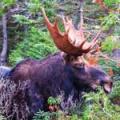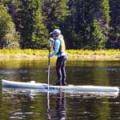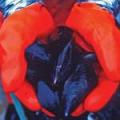Awanadjo Almanack - Issue 118
Blue Hill: the Town, the Bay, the Mountain
By Rob McCall
“I prefer winter and fall, when you feel the bone structure of the landscape—the loneliness of it, the dead feeling of winter. Something waits beneath it, the whole story doesn’t show.”
Dear Friends: With their ever-dividing branches rising from the source of their being, the skeletons of oaks, maples, and birches stand against the sky like lofty, lifeless species diagrams drawn from a lecture by the Architect of the Universe. A hardwood tree in January looks as dead as can be, but break a twig on a warm day and you may quickly notice a faint pulsing of sap and later a tiny icicle hanging from the wound. Take a piece of firewood from the wood box and notice two kinds of growth rings: the wider, lighter, softer summer rings and the narrower, darker, harder winter ones. In its deep sleep a tree still slowly grows even in the dead of winter. It is sustained by the food it made during the leafy months and stored in its roots for the leafless days ahead. In the woods, squirrels and field mice survive on nuts and seeds they gathered before the snow and cached away underground.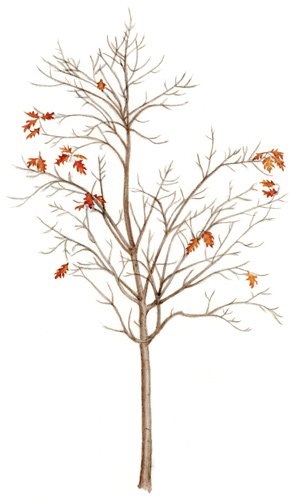 Illustrations by Candace Hutchison (3)Somewhere on Awanadjo—Blue Hill, “Small Misty Mountain” in the Algonkian language—a great mother black bear sleeps the long sleep of winter in her den, eating nothing, breathing invisibly, heart barely beating, gestating a tiny pair of cubs within her warmth. Imagine her simple hibernate dreams of fresh air and water, sparkling sun, rich browse, and ample nuts and berries. She has nothing, and yet these dreams are enough to sustain her. We have everything, yet never enough to satisfy us.
Aside from always wanting more and not sleeping that well, we’re not so different from the trees and the bears really. Our bodies survive the winter on stored food, and our souls survive on dreams stored away in our hearts on brighter, warmer days. Our souls take nourishment from the thoughts and theories, stories and songs cached in books, plays, concerts, and ceremonies. If we manage to grow a little, too, it is by feeding on the rich reserves of the past. This growth may be darker and harder like winter wood, but it gives us a stalwart durability to stand up to storm and cold, and the simple rigors of winter life.
Just as we store up fuel and food during the warm months to sustain us through the cold, we can store up plans, dreams, and visions during the cold months to inspire and guide us when the leaves again return to the trees. It is a time to look back and pack up the past, then look forward to form the future.
Plot out your next garden, or book, or painting, or wedding. Sketch the new boat, or the new outbuilding, or the new world. Dream up new schemes to save money, or energy, or time, or the planet. Envision a trip beyond the far corners of Maine, or beyond the far corners of your mind. In a warm window, start seeds of broccoli and beauty, cilantro and silence, hollyhocks and hope, cabbage and compassion, peas and peace, to enrich the dreams of a bleak midwinter.
A seedpod to carry around with you
From Kahlil Gibran: “Like the seeds dreaming beneath the snow, your heart dreams of spring.”
Field and forest report
Yes, the black bears are slumbering soundly in their dens for the duration, and the little brown bats in the attic, and the wood frogs in the mud of the pond. But on a milder night the skunks may rouse themselves and dig about in the dark, and the porcupines may rise to greet the cold dawn with reverence. During the day, chipmunks and gray squirrels tunnel through the deep snow in the yard searching for spilled sunflower seeds, and chickadees, finches, woodpeckers, and cardinals fuss at the feeders. At night the birds retire to their roosts under snow-laden branches to hunker down, slumber lightly, and knit up the raveled sleeve of winter care. Sleep, sleep soundly, one and all.
Illustrations by Candace Hutchison (3)Somewhere on Awanadjo—Blue Hill, “Small Misty Mountain” in the Algonkian language—a great mother black bear sleeps the long sleep of winter in her den, eating nothing, breathing invisibly, heart barely beating, gestating a tiny pair of cubs within her warmth. Imagine her simple hibernate dreams of fresh air and water, sparkling sun, rich browse, and ample nuts and berries. She has nothing, and yet these dreams are enough to sustain her. We have everything, yet never enough to satisfy us.
Aside from always wanting more and not sleeping that well, we’re not so different from the trees and the bears really. Our bodies survive the winter on stored food, and our souls survive on dreams stored away in our hearts on brighter, warmer days. Our souls take nourishment from the thoughts and theories, stories and songs cached in books, plays, concerts, and ceremonies. If we manage to grow a little, too, it is by feeding on the rich reserves of the past. This growth may be darker and harder like winter wood, but it gives us a stalwart durability to stand up to storm and cold, and the simple rigors of winter life.
Just as we store up fuel and food during the warm months to sustain us through the cold, we can store up plans, dreams, and visions during the cold months to inspire and guide us when the leaves again return to the trees. It is a time to look back and pack up the past, then look forward to form the future.
Plot out your next garden, or book, or painting, or wedding. Sketch the new boat, or the new outbuilding, or the new world. Dream up new schemes to save money, or energy, or time, or the planet. Envision a trip beyond the far corners of Maine, or beyond the far corners of your mind. In a warm window, start seeds of broccoli and beauty, cilantro and silence, hollyhocks and hope, cabbage and compassion, peas and peace, to enrich the dreams of a bleak midwinter.
A seedpod to carry around with you
From Kahlil Gibran: “Like the seeds dreaming beneath the snow, your heart dreams of spring.”
Field and forest report
Yes, the black bears are slumbering soundly in their dens for the duration, and the little brown bats in the attic, and the wood frogs in the mud of the pond. But on a milder night the skunks may rouse themselves and dig about in the dark, and the porcupines may rise to greet the cold dawn with reverence. During the day, chipmunks and gray squirrels tunnel through the deep snow in the yard searching for spilled sunflower seeds, and chickadees, finches, woodpeckers, and cardinals fuss at the feeders. At night the birds retire to their roosts under snow-laden branches to hunker down, slumber lightly, and knit up the raveled sleeve of winter care. Sleep, sleep soundly, one and all.
 Years ago, way out the Leighton Point Road in West Pembroke, there was a dilapidated farmhouse. The roof sagged, the chimneys leaned, the clapboards showed no signs of paint, and lilacs and alders grew tall and untamed in the front yard. But your eye was invariably drawn up to the high dormer windows filled with bright green and red geraniums pressed eagerly against the glass. I admired those geraniums and the old lady who lovingly and tenaciously tended them in that bleak house. They said, “I’m still here. I can still love. I haven’t given up.”
The house has fallen down long since, and I’ve often wondered whether her geraniums died in the wreckage or were saved to brighten someone else’s windows in winter. There was a similar old farmhouse and barn on Route 1A between Holden and Brewer with geraniums in the windows. Maybe they’re still there. I hope so.
Geraniums are like common people whom “the Lord must love,” as Abraham Lincoln observed, “since He made so many of them.” They’re tough, hardy, and low-maintenance. They can take sun or frost or heavy cutting and come back stronger and brighter than ever.
In honor of that unquenchable spirit, I keep our dozen or so aged geraniums in the windows of the parsonage throughout the winter. I talk to them, deadhead them, feed and water them just like members of the family. They always bend toward the sun. Each morning we see our flourishing geraniums first, before we look farther out to the bare trees and the pale expanses of frozen ground all around us. This gives us, and anyone who looks in our windows, a feast of color and life, and a taste of faith and hope to brighten the bleak days of these winter months.
Rank opinion
Years ago, way out the Leighton Point Road in West Pembroke, there was a dilapidated farmhouse. The roof sagged, the chimneys leaned, the clapboards showed no signs of paint, and lilacs and alders grew tall and untamed in the front yard. But your eye was invariably drawn up to the high dormer windows filled with bright green and red geraniums pressed eagerly against the glass. I admired those geraniums and the old lady who lovingly and tenaciously tended them in that bleak house. They said, “I’m still here. I can still love. I haven’t given up.”
The house has fallen down long since, and I’ve often wondered whether her geraniums died in the wreckage or were saved to brighten someone else’s windows in winter. There was a similar old farmhouse and barn on Route 1A between Holden and Brewer with geraniums in the windows. Maybe they’re still there. I hope so.
Geraniums are like common people whom “the Lord must love,” as Abraham Lincoln observed, “since He made so many of them.” They’re tough, hardy, and low-maintenance. They can take sun or frost or heavy cutting and come back stronger and brighter than ever.
In honor of that unquenchable spirit, I keep our dozen or so aged geraniums in the windows of the parsonage throughout the winter. I talk to them, deadhead them, feed and water them just like members of the family. They always bend toward the sun. Each morning we see our flourishing geraniums first, before we look farther out to the bare trees and the pale expanses of frozen ground all around us. This gives us, and anyone who looks in our windows, a feast of color and life, and a taste of faith and hope to brighten the bleak days of these winter months.
Rank opinion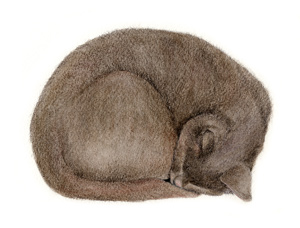 Faith needs to be tended, too. You don’t get faith once and for all with no effort. It needs regular care. Faith and belief are not the same. Belief is like an artificial flower that doesn’t change or grow and needs no tending. Faith is like a geranium. It is a living thing that needs good food, fresh water, pure light, and fresh air. Looking out over the bleak winter landscape of America—a landscape of lost jobs, lost homes, and faltering faith—I say give us geraniums, in the windows of the school house and the town house, the food pantry and the thrift shop. Give us geraniums in the bleak windows of the State House, the Blaine House, the White House, the House of Rothschild, both Houses of Congress, and every house of correction. Give us geraniums to say, “We’re still here. We can still love. We haven’t given up.”
Geraniums in winter windows will help the few who are on the inside looking out, and they will help the many who are on the outside looking in, because without faith, hope, and love, even the greatest nation or people will too soon wither and die.
From the mailbag
This from field agent Kathie Krause on Monhegan Island: “[We are] archeologists digging ourselves out of a frozen lava, frozen in time, cat curled up on a chair/ loaves of bread in the oven/ well-worn deck of cards on the table just as it was before the eruption/ as pathways to homes are dug, apple-cheeked diggers and the formerly trapped inside greet and chat and exclaim about the air still full of snow and the sun breaking open the grey to blue ether above/ trillions of stars lay shining on the new matterhorns and alps in ranges around the house/ a path is dug to the chicken coop/ the hens are liberated and gobble up their food and drink down bits of snow/ frost moustaches above their beaks. A nuthatch is hogging the feeder and chickadees are dancing around between branches and snow, scolding, impatient, indignant, jaunty/ leaving their delicate cross-hatching in the snow below the feeder.”
That’s the almanack for this time. But don’t take it from us—we’re no experts. Go out and see for yourself.
Faith needs to be tended, too. You don’t get faith once and for all with no effort. It needs regular care. Faith and belief are not the same. Belief is like an artificial flower that doesn’t change or grow and needs no tending. Faith is like a geranium. It is a living thing that needs good food, fresh water, pure light, and fresh air. Looking out over the bleak winter landscape of America—a landscape of lost jobs, lost homes, and faltering faith—I say give us geraniums, in the windows of the school house and the town house, the food pantry and the thrift shop. Give us geraniums in the bleak windows of the State House, the Blaine House, the White House, the House of Rothschild, both Houses of Congress, and every house of correction. Give us geraniums to say, “We’re still here. We can still love. We haven’t given up.”
Geraniums in winter windows will help the few who are on the inside looking out, and they will help the many who are on the outside looking in, because without faith, hope, and love, even the greatest nation or people will too soon wither and die.
From the mailbag
This from field agent Kathie Krause on Monhegan Island: “[We are] archeologists digging ourselves out of a frozen lava, frozen in time, cat curled up on a chair/ loaves of bread in the oven/ well-worn deck of cards on the table just as it was before the eruption/ as pathways to homes are dug, apple-cheeked diggers and the formerly trapped inside greet and chat and exclaim about the air still full of snow and the sun breaking open the grey to blue ether above/ trillions of stars lay shining on the new matterhorns and alps in ranges around the house/ a path is dug to the chicken coop/ the hens are liberated and gobble up their food and drink down bits of snow/ frost moustaches above their beaks. A nuthatch is hogging the feeder and chickadees are dancing around between branches and snow, scolding, impatient, indignant, jaunty/ leaving their delicate cross-hatching in the snow below the feeder.”
That’s the almanack for this time. But don’t take it from us—we’re no experts. Go out and see for yourself.

Rob McCall is a journalist, naturalist, and fiddler, and pastor of the First Congregational Church of Blue Hill, Maine UCC. This column derives from his weekly radio show on WERU, 89.9 FM, Blue Hill and 99.9 Bangor. Readers can contact him directly via e-mail: awanadjoalmanack@gmail.com or post a comment using the form below.
—Andrew Wyeth
Dear Friends: With their ever-dividing branches rising from the source of their being, the skeletons of oaks, maples, and birches stand against the sky like lofty, lifeless species diagrams drawn from a lecture by the Architect of the Universe. A hardwood tree in January looks as dead as can be, but break a twig on a warm day and you may quickly notice a faint pulsing of sap and later a tiny icicle hanging from the wound. Take a piece of firewood from the wood box and notice two kinds of growth rings: the wider, lighter, softer summer rings and the narrower, darker, harder winter ones. In its deep sleep a tree still slowly grows even in the dead of winter. It is sustained by the food it made during the leafy months and stored in its roots for the leafless days ahead. In the woods, squirrels and field mice survive on nuts and seeds they gathered before the snow and cached away underground.
 Illustrations by Candace Hutchison (3)
Illustrations by Candace Hutchison (3)At night the birds retire to their roosts under snow-laden branches to hunker down, slumber lightly, and knit up the raveled sleeve of winter care. Sleep, sleep soundly, one and all.
Sleep-pods to carry to bed with you
From Woody Allen: “The lion and the calf shall lie down together, but the calf won’t get much sleep.”
And from Leo J. Burke: “People who say they sleep like a baby usually don’t have one.”
Natural events
I’ve never been lost on a mountain in Maine for long, like Donn Fendler was on Katahdin, but I have been on a strange trail on an unfamiliar mountain with a good friend whose GPS showed nothing. I have found the way from island to island in the fog for five days with 15 people in three dories under my care and only a chart and compass to guide us. I have found my way around a strange city for days with only a couple of dollars in my pocket, and I have been known to wander around a big-box store for a very long time before asking for directions.
Nearly as bad as being lost is trying to find someone else who is. In our early days at Cobscook Bay, two youngsters got lost in the thick woods between the car and the campsite, a distance of less than 100 yards. One showed up a mile away and an hour and half later. The other showed up just where he was supposed to be in about ten minutes. But the searcher’s growing feelings of panic, of swirling thoughts, of running in circles and suppressing screams are as real as being lost yourself.
Worst of all is not knowing that you are lost; moving blithely along toward your destination only to find when you arrive that it is not there at all. Then the terror and panic and self-doubt hit all at once with a blow that can drive the wind right out of you.
If you’ve ever been lost on land or sea, you’ve felt the loss of reason and perspective, the fear of insignificant things, the urge to grasp at straws or follow phantoms or your own follies. It is said that the lost tend to go in circles. They throw their compass away because it doesn’t agree with them. They run until exhausted; they tear off their clothes. They are seized by an overwhelming terror that clouds the mind and overwhelms the body.
Think of the Franklin Expedition lost in the wide, white spaces of the Arctic, some of them wandering for years before their deaths. Think of Mallory on the high slopes of Everest. Think of Scott and crew freezing in their tents in vast expanses of white so near the South Pole, dying with the cold sense that they would never see home again.
In days of old, local knowledge and the carefully preserved traditions of the elders told us the way, and people rarely traveled alone into strange territory. But today extreme adventure is the thing. Higher! Farther! Harder! Faster! Ever onward into the unknown!
Trooper report, depths-of-winter division
You might enjoy this from the state police report in Maine’s farthest downeast newspaper, The Quoddy Tides, February 11, 2011. It may give you an idea why we like Maine and especially Washington County so much:
“Trooper Jason Fowler and Trooper Tim McCadden responded to a domestic dispute at a residence in Robbinston. The investigation disclosed that the man and his wife, who are both elderly, were arguing over which one of them should wash the dishes. The man wanted troopers to resolve the argument. Trooper Fowler determined that since the wife had done all the cooking without any assistance from the man, he should wash the dishes. The man agreed to this, and no further action was taken.”
Rank opinion
Whole nations can get lost, too, like the Hebrew people who wandered in great circles for 40 years in the wilderness instead of following their Creator, who led them out of captivity into freedom. Given freedom, they longed for security and comfort. Given food, they complained it wasn’t enough. Given water, they didn’t like the taste. Ungrateful and heedless of heaven, they melted their treasures and cast a golden calf to worship. They lost their reason and perspective, feared insignificant things, followed phantoms and their own follies. A whole nation lost.
But then why should that be any concern of ours?
More natural events

Yr. mst. hmble & obd’nt servant,
Rob McCall

Rob McCall is a journalist, naturalist, and fiddler, and pastor of the First Congregational Church of Blue Hill, Maine UCC. This column derives from his weekly radio show on WERU, 89.9 FM, Blue Hill and 99.9 Bangor. Readers can contact him directly via e-mail: awanadjoalmanack@gmail.com or post a comment using the form below.
Related Articles
Share this article:
2023 Maine Boat & Home Show

Join Us for the Maine Boat & Home Show!
Art, Artisans, Food, Fun & Boats, Boats, Boats
August 11 - 13, 2023 | On the waterfront, Rockland, Maine
Click here to pre-order your tickets.
Show is produced by Maine Boats, Homes & Harbors magazine.







